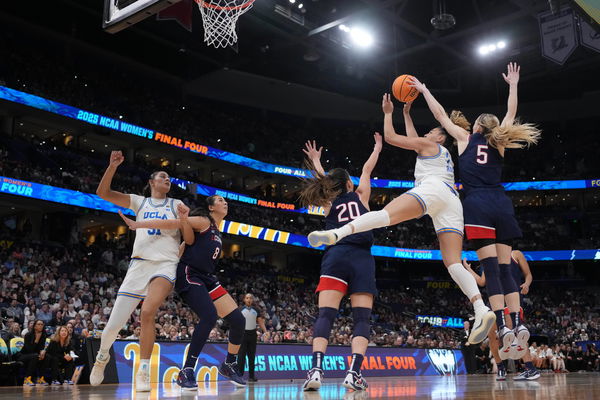
via Imago
NCAA, College League, USA Womens Basketball: Final Four National Semifinal-Connecticut at UCLA Apr 4, 2025 Tampa, FL, USA UCLA Bruins guard Kiki Rice 1 shoots against Connecticut Huskies guard Paige Bueckers 5 and guard Kaitlyn Chen 20 during the fourth quarter in a semifinal of the women s 2025 NCAA tournament at Amalie Arena. Tampa Amalie Arena FL USA, EDITORIAL USE ONLY PUBLICATIONxINxGERxSUIxAUTxONLY Copyright: xKirbyxLeex 20250404_ajw_al2_374

via Imago
NCAA, College League, USA Womens Basketball: Final Four National Semifinal-Connecticut at UCLA Apr 4, 2025 Tampa, FL, USA UCLA Bruins guard Kiki Rice 1 shoots against Connecticut Huskies guard Paige Bueckers 5 and guard Kaitlyn Chen 20 during the fourth quarter in a semifinal of the women s 2025 NCAA tournament at Amalie Arena. Tampa Amalie Arena FL USA, EDITORIAL USE ONLY PUBLICATIONxINxGERxSUIxAUTxONLY Copyright: xKirbyxLeex 20250404_ajw_al2_374
In the US, collegiate athletes have multiple channels to make money apart from their earnings through competitions. The NCAA’s name, image, and likeness (NIL) regulations allow student-athletes to pocket copious amounts through endorsements, brand sponsorships, and more. Through these, hundreds of college stars have raked in millions of dollars. However, all that could change soon.
Today, the NIL offers athletes the opportunity to earn beyond their collegiate commitments. But that wasn’t always the case. Before 2021, the NIL didn’t exist, and the NCAA prohibited athletes from using their names to earn via outside contracts. The regulation was rolled out as a result of Grant House’s 2020 anti-trust lawsuit against the NCAA. Now, as the highly-debated issue reaches a settlement, athletes face a new threat.
ADVERTISEMENT
Article continues below this ad
NCAA stars fear end of career because of NIL settlement
An article by On3.com from April 7 highlights how the House vs. NCAA lawsuit settlement could introduce roster restrictions for collegiate programs in the coming days. U.S. district judge Claudia Wilken “suggested a grandfather clause as part of a transition to new roster limits set under the agreement,” during Monday’s final approval meeting for the ongoing case, the article notes. By default, this would also have significant impacts on how much the athletes could profit from the NIL.

via Imago
UConn guard Azzi Fudd 35 shoots over UCLA center Lauren Betts 51 in the first half in the Final Four round of the NCAA, College League, USA Women s Basketball tournament at Amalie Arena in Tampa, Florida on Friday, April 4, 2025. PUBLICATIONxINxGERxSUIxAUTxHUNxONLY TMP20250404920 STEVExNESIUS
In case full approval is granted to the settlement, it would drastically reduce how many athletes can be on the team roster. Affected sports will include football, women’s basketball, softball, and volleyball, among others. Naturally, the thought of being cut from the roster in the coming years is already weighing down upon athletes. Gannon Flynn, a swimming star from Utah, presented his arguments to the district judge, drawing attention to how the settlement could have negative impacts on their collegiate careers, also affecting NIL earnings. “If you don’t have a perfect season. You might not get another,” Flynn said in court.
At the hearing, there were significant discussions about what the settlement could imply for current and future collegiate athletes. While trying to fathom the roster limitation implications, Judge Wilken came up with suggestions of a “grandfather clause” for current athletes in order to protect their rights and ensure that they don’t end up losing financially because of the settlement. While it remains to be seen how the settlement attempts to protect the athletes, Flynn’s skepticism isn’t baseless either. Similar sentiments were also highlighted by more stars who have been following the case with a keen eye.
ADVERTISEMENT
Article continues below this ad
More athletes put up strong arguments
Olivia Dunne, an LSU gymnast and one of the highest-valued college stars in the country, also objected to how the settlement would be unfair. Over the years, Dunne has noted several times that the NIL is unfair to women athletes. The House vs. NCAA settlement would prompt the nation’s apex collegiate athletics body to disburse over $2 billion to athletes as back pay. However, given that the amount will be distributed based on the specific sport’s earnings, Dunne pointed out that it would result in many athletes suffering from Judge Wilken’s verdict, should the settlement come into play.
What’s your perspective on:
Will the NIL settlement destroy college sports as we know it, or is it a necessary change?
Have an interesting take?

USA Today via Reuters
Apr 20, 2024; Fort Worth, TX, USA; LSU Tigers gymnast Olivia Dunne warms up on floor before the start of the 2024 Womens National Gymnastics Championship at Dickies Arena. Mandatory Credit: Jerome Miron-USA TODAY Sports
“This settlement doesn’t come close to recognizing the value I lost. This entire process defines athlete value based on the sport you played in and how much revenue your team brought in,” Dunne added, “but NIL is about more than wins and revenue,” Dunne stated via Zoom. However, it isn’t like the revamped NIL regulation will be the first time that the NCAA athletes or staff would complain about it.
ADVERTISEMENT
Article continues below this ad
Last year, UNC wrestling head coach Rob Koll also thrashed the NIL for deviating focus from the sport itself. “….it has not changed the sport at all it’s the exact same thing,” the veteran coach stated about how the hope of making money prompted many of his colleagues to run after better deals rather than actually helping the sport grow.
Do you agree with Koll’s take? How do you think the new NIL regulation could also undermine the athletes’ true worth? Tell us your thoughts below!
ADVERTISEMENT
ADVERTISEMENT
ADVERTISEMENT
ADVERTISEMENT


Will the NIL settlement destroy college sports as we know it, or is it a necessary change?